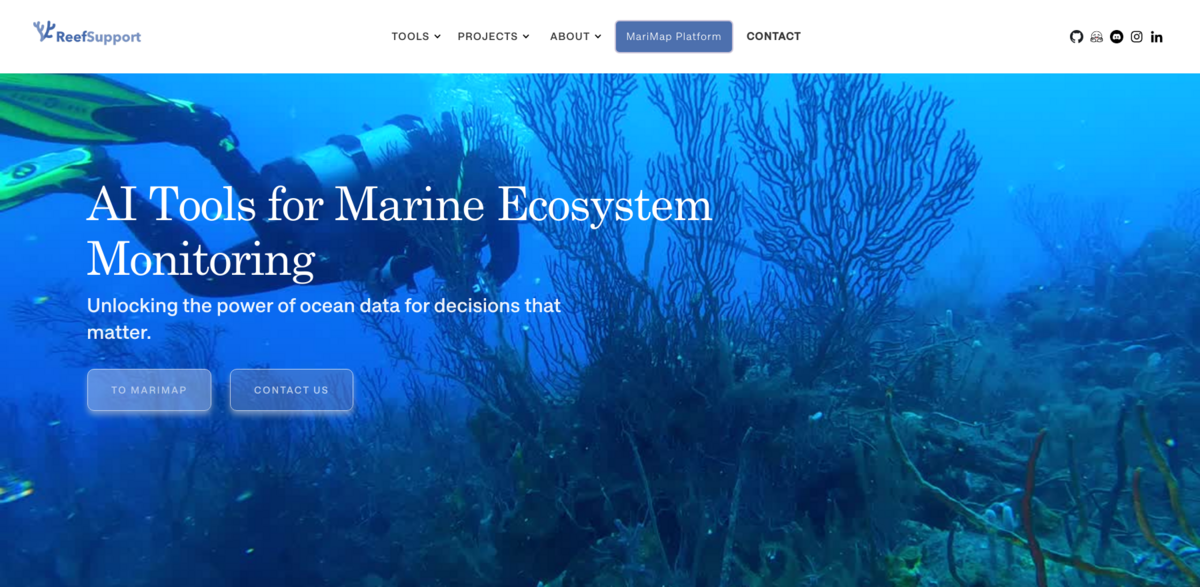What is MariMap?
MariMap is Reef Support’s interactive platform for mapping, monitoring, and reporting on marine ecosystems. It brings together in-situ data, geospatial layers, and reporting – making data more accessible, promoting informed decision-making, and enhancing collaboration between stakeholders. This tool is at the heart of marine conservation efforts and central to understanding coastal dynamics. Its intuitive design and comprehensive dataset gathering support healthy reef systems, aquaculture and fisheries, coral conservation, beaches and ecotourism, and debris management – a combination that makes it a powerful resource in today’s environmentally conscious world.
Main Benefits and Key Figures
The project delivers distinct advantages and presents key facts that highlight its importance:
- Open Coral AI (2021 – Present): Accelerates data analysis and reporting of coral reef health by employing AI for determining live coral cover.
- Mangrove AI (2024 – Present): Integrates in-situ observations, remote sensing, and computer vision to monitor and conserve critical mangrove ecosystems.
- Algae Monitoring and Water Quality Assessment (2023 – Present): Focuses on identifying and quantifying algal blooms, vital for water quality management.
- Plastic Tracker (2023 – 2024): Uses GAN-enhanced satellite imagery to detect plastic debris in oceans, riverways, and lakes around the globe.
- Conservation Training – “Travel + Learn + Restore”: Offers hands-on opportunities to explore destinations worldwide while contributing directly to marine conservation.
- Oceantech R&D: Develops software using AI, satellite, and in-situ data to provide insights for sustainable coastal and marine activities.
Innovative AI Tools for Marine Monitoring
The project includes a suite of AI tools that unlock the power of ocean data for decisions that really matter… Among them is Open Coral AI, which generates precise hard and soft coral cover from photos and models. This tool addresses bottlenecks in coral reef monitoring, ensuring that critical data analysis is both fast and reliable. Meanwhile, the Fish Abundance module generates counts of fish and biodiversity metrics directly from video feeds, thereby offering a direct insight into marine life health. Not to be left behind, the Algae Tracker detects the presence of biomass – even plastics – by processing satellite data, emphasizing the dynamic use of technology to monitor marine environments. Each tool works in concert to provide a complete and accurate view of marine ecosystems.
Conservation Training and Global Impact
In a refreshing shift from strictly technical innovation, Reef Support champions conservation training through the “Travel + Learn + Restore” initiative. This program offers a unique chance for conservation enthusiasts to explore various destinations, learn about marine ecology firsthand, and contribute actively to preservation efforts. The training initiative not only builds capacity among global communities but also fosters a network of passionate individuals and organizations committed to safeguarding coastal and reef environments. The hands-on experience, paired with the latest in scientific analysis, creates a vibrant, educational environment that resonates beyond borders… capturing the essence of what it means to truly engage with nature.
Oceantech R&D: Advancing Coastal Solutions
Oceantech R&D represents the technical engine driving Reef Support’s ambitious projects. By tapping into the latest advancements in AI, satellite, and in-situ data collection, the R&D efforts help ensure that coastal development, marine conservation, and sustainable ocean industries are informed by the best available evidence. This research and development process is not isolated but is intertwined with collaborations from over 30 organizations around the world, working together in reef, cetacean, and shark protection. The blend of academic insight and real-world application pushes boundaries and continuously improves the understanding of coastal ecosystems.
Project Impact and SDGs
- SDG 13: Climate Action – Tackling climate-related challenges through targeted data collection and analysis.
- SDG 14: Life Below Water – Protecting and preserving underwater ecosystems using advanced monitoring technologies.
- SDG 15: Life on Land – Complementing marine efforts with broader ecological conservation strategies.
- SDG 17: Partnerships for the Goals – Strengthening global collaborations for a sustainable blue future.
About Reef Support and Underlying Technology
Reef Support stands as a pillar in the field of marine conservation by developing modern technology tailored for coral reef and marine ecosystem monitoring. The platform also functions as an online monitoring, predictive maintenance tool, and auditing solution using AI and satellite imaging. At its core lies Reef.io – an intuitive backend AI system that produces valuable data insights from satellite imagery. When combined with client-uploaded data, Reef.io builds comprehensive pictures of reef ecology, fishery conditions, and land movement across wide spatial and temporal scales. This data is rapidly processed and shared by Reef Support’s team of experts and partners to support commercial applications and environmental protection strategies. Moreover, Reef Support reinforces its commitment by acting as a technical sponsor for reef conservation projects around the world… ensuring that innovation and nature continue to thrive side by side.






















